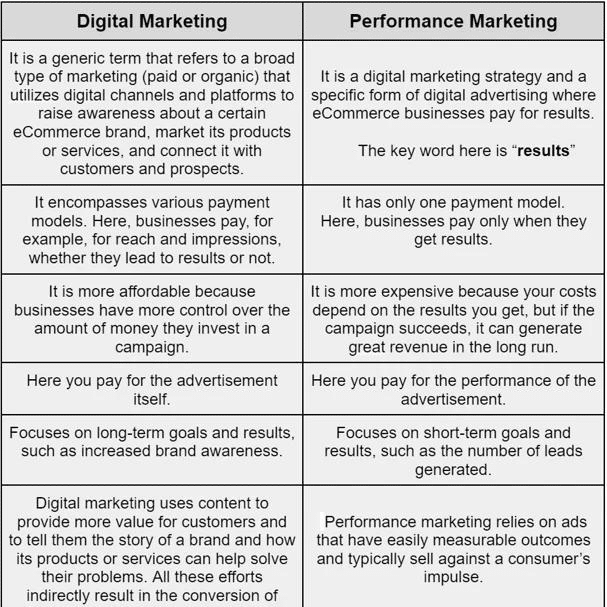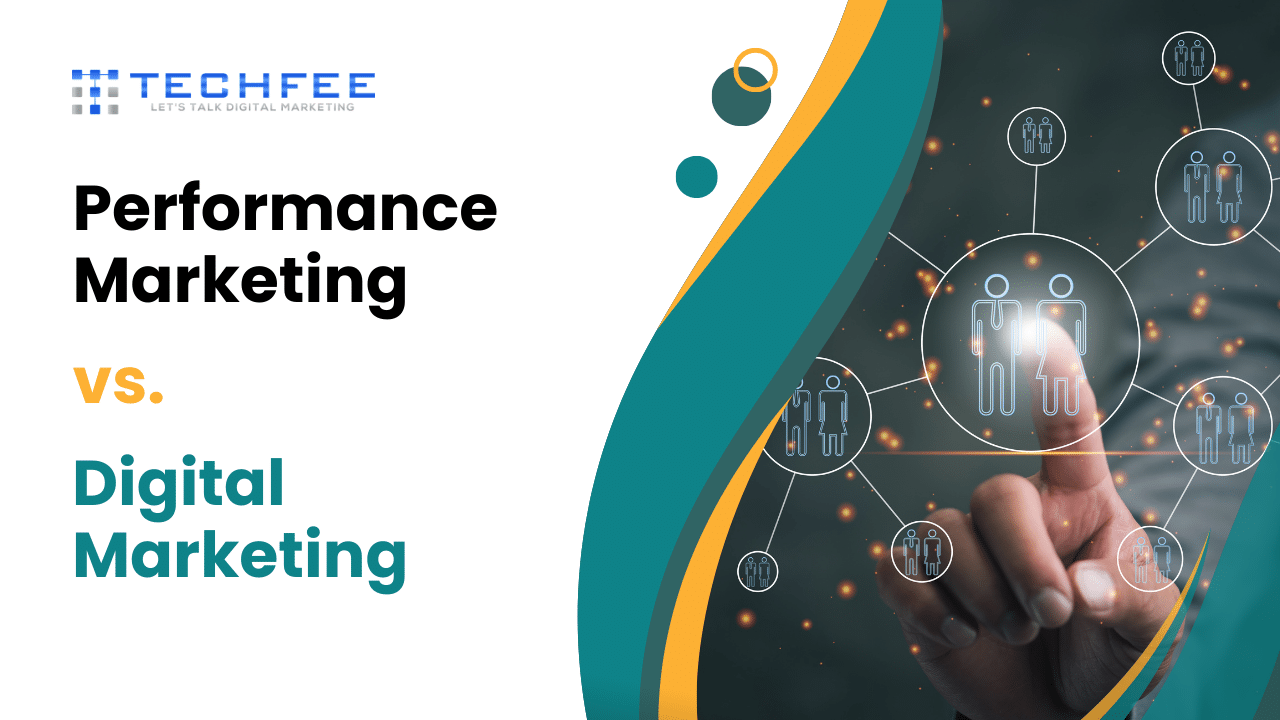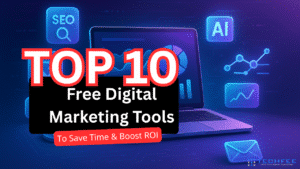Let’s discuss the differences between Performance Marketing vs. Digital Marketing………..
In the online business world, companies get their names out there in two main ways: Performance Marketing and Digital Marketing.
Performance Marketing is about seeing direct results from specific actions, while Digital Marketing covers a broader range of online promotion.
Understanding these strategies and why they matter helps to break down what makes Performance Marketing so targeted and Digital Marketing so broad.
Looking back at how these strategies evolved helps us see how marketing has changed in the digital age.
Understanding Performance Marketing
Performance marketing is a dynamic approach focused on driving specific actions, often measured through tangible and quantifiable metrics.
At its core, the primary objective of performance marketing is to generate measurable results and outcomes, emphasizing a direct correlation between marketing efforts and their impact on the bottom line.
Core Objectives
The essence of performance marketing revolves around achieving precise objectives.
These objectives can vary significantly based on the campaign or business goals, often centering around actions such as lead generation, sales, app downloads, website visits, or any other measurable user engagement.
Key Metrics and KPIs:
Performance marketing heavily relies on key metrics and KPIs to evaluate success. Some of the critical metrics include:
- Conversion Rate: This measures the percentage of users who take the desired action after engaging with a marketing campaign. It could be purchasing, signing up for a newsletter, or filling out a form.
- Return on Investment (ROI) Analysis: ROI is a pivotal metric that calculates the revenue generated compared to the cost of the marketing campaign. It helps in assessing the profitability and efficiency of marketing efforts.
- Click-Through Rate (CTR): CTR reflects the ratio of users who click on a specific link to the total number of users who view a page, email, or advertisement. It indicates the effectiveness of the marketing message in encouraging user interaction.
- Cost Per Acquisition (CPA): CPA measures the cost of acquiring a customer who completes the desired action. It assists in determining the efficiency of acquiring new customers or leads.
- Customer Lifetime Value (CLV): CLV estimates the total revenue a business can expect from a single customer over their entire relationship. It helps in understanding the long-term value generated from acquired customers.
By meticulously tracking these metrics and KPIs, performance marketers can gain valuable insights into the effectiveness of their strategies, allowing for data-driven optimizations and informed decision-making.
Types of Performance Marketing
Several impactful strategies stand out in performance marketing, each with unique power to drive results and engagement.
Affiliate Marketing, a cornerstone in this landscape, thrives on partnerships and mutual benefits. Businesses leverage the prowess of affiliate networks and collaborate with affiliates who promote their products or services.
These affiliates earn commissions based on their traffic or sales, fostering a symbiotic relationship where success is shared.
Influencer Marketing, a contemporary juggernaut, capitalizes on the reach and influence of individuals with a dedicated following.
Brands align with influencers whose values and audience resonate with their own, harnessing the influencer’s credibility and rapport to amplify brand messaging.
The authentic connections influencers foster with their audience often result in heightened engagement and conversions.
Search Engine Marketing, a dynamic and multifaceted approach, enhances visibility and drives traffic through search engines.
It encompasses SEO (Search Engine Optimization) and paid advertising (PPC – Pay-Per-Click). SEO optimizes website content and structure to improve organic search rankings, while PPC utilizes targeted ads displayed on search engine result pages, enabling businesses to reach specific audiences with precision.
These performance marketing techniques showcase the diversity and efficacy within the digital sphere, each offering a distinct avenue to achieve marketing objectives while emphasizing measurable results and performance metrics.
Difference Between Performance Marketing Vs. Digital Marketing

Exploring Digital Marketing
Digital marketing encompasses a broad spectrum of strategies and tools designed to reach and engage with audiences in the digital realm.
Its expansive scope integrates various components that contribute to a brand’s online presence and visibility.
Scope and Components: At its core, digital marketing involves leveraging digital channels to connect with current and prospective customers.
This includes but isn’t limited to content marketing, social media marketing, email marketing, search engine optimization (SEO), pay-per-click (PPC) advertising, and more. Each component is a distinct avenue for reaching specific audience segments, fostering engagement, and driving conversions.
Content Marketing: A cornerstone of digital marketing, content marketing involves creating and distributing valuable, relevant, and consistent content to attract and retain a clearly defined audience.
Whether through blog posts, videos, infographics, or podcasts, compelling content forms the backbone of a brand’s storytelling and relationship-building efforts.
Social Media Marketing: With the proliferation of social media platforms, brands utilize these channels to connect with their audience on a more personal level.
From organic posts to targeted advertisements, social media marketing aims to foster engagement, build brand loyalty, and drive traffic to websites or landing pages.
Email Marketing: Despite being one of the oldest digital marketing strategies, email marketing remains highly influential. Crafting personalized, targeted emails allows businesses to nurture leads, promote products or services, and maintain ongoing communication with their audience.
Key Performance Indicators (KPIs): Metrics are pivotal in evaluating the success of digital marketing campaigns.
KPIs such as website traffic, conversion rates, click-through rates (CTR), bounce rates, and engagement metrics provide valuable insights into the performance of various strategies and help in making data-driven decisions.
Trends in Digital Marketing: The digital marketing landscape is ever-evolving, characterized by continuous innovation and adaptation to emerging trends.
Some current trends include the rise of video content, influencer marketing, conversational marketing powered by AI chatbots, the increasing importance of mobile optimization, and the integration of augmented reality (AR) and virtual reality (VR) experiences.
As digital technologies advance and consumer behaviors evolve, staying abreast of these trends and adapting strategies accordingly becomes imperative for businesses seeking to remain competitive in the digital space.
Points of Divergence
In the ever-evolving marketing landscape, the divergence between performance and digital marketing becomes most apparent in their distinctive approaches and emphases.
The fundamental contrast lies in the focus on Return on Investment (ROI). Performance marketing operates within a stringent framework centered explicitly on measurable outcomes.
Every campaign and every tactic is meticulously crafted and calibrated to yield tangible results, making ROI the North Star guiding every decision.
Contrastingly, digital marketing encompasses a broader spectrum, emphasizing brand visibility and audience engagement considerably.
While ROI remains crucial, the focus extends beyond immediate conversions to encompass a holistic brand presence and online visibility.
Another pivotal point of divergence emerges in the realm of reach. Digital marketing often emphasizes casting a wide net, reaching a broad audience across various digital channels.
Its essence lies in creating widespread brand awareness, fostering engagement, and nurturing a long-term relationship with the audience.
In stark contrast, performance marketing zeroes in on precision targeting. It leverages data-driven strategies to pinpoint and engage with particular audience segments, optimizing conversion rates and driving tangible, immediate actions.
The methods employed to reach these divergent goals further illustrate their differences. Performance marketing thrives on data-driven precision, utilizing sophisticated targeting methods such as retargeting, behavioral targeting, and predictive analytics to connect with the right audience at the right time.
Conversely, digital marketing employs a mix of strategies encompassing content marketing, social media engagement, SEO, and influencer partnerships, aiming to create a broad digital footprint and engage with audiences across multiple touchpoints.
Moreover, the variance in cost structures and budget allocation is a defining factor. Performance marketing typically operates on a pay-per-performance model, where advertisers pay only for actual results achieved, aligning closely with the ROI-driven approach.
On the contrary, digital marketing often involves:
- Allocating budgets across various channels based on broader marketing objectives.
- Encompassing brand building.
- Content creation.
- Ongoing engagement initiatives.
While performance and digital marketing operate within the digital landscape, their divergent approaches in prioritizing ROI, reach strategies, targeting methodologies, and budget allocation delineate their distinct paths to achieving marketing success.
Suitability and Application
Industries and Scenarios for Performance Marketing
Performance marketing thrives in industries where measurable outcomes and direct conversions are paramount. E-commerce is the pinnacle for performance marketing, where tangible results, such as clicks, conversions, and sales, are easily quantifiable.
Additionally, sectors like finance, education, and travel benefit from the precision of performance marketing, as it allows for a clear correlation between marketing efforts and customer actions.
Its adaptability in lead generation, app downloads, and subscription-based services makes it an optimal choice for businesses seeking immediate and traceable results.
Industries and Scenarios for Digital Marketing
Digital marketing, with its broader scope, finds resonance across various industries and scenarios, particularly in brand building and fostering long-term relationships.
Industries like healthcare, real estate, and automotive sectors harness the power of digital marketing to build brand authority, engage with diverse audiences, and establish trust over time.
Content marketing, social media campaigns, and SEO strategies form the cornerstone of digital marketing, providing avenues for storytelling and community engagement, making it an indispensable tool for industries reliant on relationship-building and brand loyalty.
In essence, while performance marketing offers immediate and quantifiable results suitable for transactional industries, digital marketing is a holistic approach catering to diverse sectors, fostering brand affinity and long-term relationships.
Synergies and Integration
In the dynamic realm of modern marketing, integrating performance and digital strategies is a pivotal cornerstone. The synergy between these two approaches isn’t merely about coexistence; it’s about orchestrating a harmonious blend that amplifies their collective impact.
Harmonizing performance and digital strategies involves aligning objectives, metrics, and tactics to ensure a unified front that drives toward overarching business goals.
Central to this synergy is cross-channel collaboration, an essential facet that bridges the gap between performance and digital marketing realms. Collaboration across various channels—social media, search, display advertising, or content marketing—fosters a seamless customer journey.
This collaborative effort optimizes individual channel performance and accentuates the overall impact through a synchronized approach, ensuring a cohesive brand experience across touchpoints.
However, achieving this integration and collaboration necessitates a robust infrastructure supported by integrated tools and platforms.
These technological enablers are the backbone, facilitating data sharing, analysis, and decision-making.
Integration of tools like Customer Relationship Management (CRM) systems, marketing automation platforms, and analytics tools consolidates insights, streamlines workflows, and empowers marketers to make informed, data-driven decisions.
Ultimately, the convergence of performance and digital marketing isn’t a juxtaposition of two strategies but a fusion that capitalizes on their complementary strengths.
It’s about creating a symphony where each element plays a crucial role in amplifying the other, resulting in a unified force that propels the brand toward unparalleled success in the ever-evolving digital landscape.
Challenges and Limitations
In the dynamic realm of modern marketing, both Performance Marketing and Digital Marketing come with their share of challenges and limitations that businesses must navigate.
Attribution and Tracking Challenges stand as a fundamental hurdle, especially in the nuanced landscape of Performance Marketing.
Ascertaining the exact source of conversions and attributing them accurately poses difficulties due to the multi-touchpoint nature of consumer interactions across various channels.
Moreover, the specter of Ad Fraud and Quality Concerns looms large over Performance and Digital Marketing initiatives.
Ad fraud, encompassing various deceitful practices like click farms and bot-generated traffic, undermines the integrity of marketing efforts, impacting ROI and skewing data analytics.
Ensuring genuine engagement and maintaining quality standards amidst a vast digital ecosystem remains an ongoing battle for marketers.
Regulatory and Compliance Issues further compound the challenges faced by marketers. With an evolving landscape of privacy regulations such as GDPR and CCPA, businesses must navigate a complex web of rules and guidelines governing data collection, usage, and consumer consent.
Staying abreast of these regulations while executing targeted marketing campaigns can be daunting, demanding constant vigilance and adaptability.
Balancing the pursuit of performance metrics and adherence to ethical standards amidst these challenges remains a pivotal concern for marketers engaged in Performance and Digital Marketing.
Successfully navigating these hurdles requires a proactive approach, leveraging technological advancements, fostering transparency, and embracing ethical practices to mitigate risks and promote sustainable growth in the ever-evolving digital marketing sphere.
Future Outlook
In contemplating the future outlook of both Performance Marketing and Digital Marketing, one must recognize the profound influence emerging technologies continue to exert on these domains.
Artificial Intelligence (AI), machine learning, augmented reality (AR), and the burgeoning realm of voice search are poised to redefine the landscape of marketing strategies.
AI’s ability to analyze data at an unprecedented scale is revolutionizing targeting precision, enabling marketers to tailor their campaigns with remarkable accuracy.
Likewise, AR and immersive technologies craft unique, interactive brand experiences that engage audiences in unimaginable ways.
Predicting the trajectory of Performance Marketing suggests a deeper integration of data-driven methodologies. The emphasis on measurable, quantifiable results will intensify, leading to a more refined understanding of consumer behavior.
The evolution of attribution models will likely become more sophisticated, attributing value across diverse touchpoints and channels.
Furthermore, the rising significance of personalized marketing will continue to shape the future as customers increasingly demand tailored, relevant content.
Conversely, the future of Digital Marketing appears poised to expand its horizons even further. The omnichannel approach will likely become the standard, necessitating seamless integration across various platforms and devices.
Voice search optimization will grow in importance, reshaping SEO strategies to accommodate conversational queries.
Moreover, the ethical use of data and privacy concerns will drive innovations in transparent, permission-based marketing approaches, fostering trust between brands and consumers.
In this rapidly evolving landscape, Performance and Digital Marketing, convergence seems inevitable. The delineation between these spheres will blur as marketers harness the power of data-driven insights and innovative technologies to deliver compelling, personalized experiences.
As we look ahead, the only certainty is the continuous evolution and adaptation demanded by the dynamic interplay of technology and consumer behavior.
Success will hinge on marketers’ agility and ability to embrace and harness the transformative potential of emerging technologies.
Conclusion
In the ever-evolving marketing landscape, the clash between Performance Marketing and Digital Marketing reveals their differences and undeniable intersections.
The key distinctions—precision-driven ROI focus of Performance Marketing versus the broader brand-building scope of Digital Marketing—underscore the versatility required in modern marketing strategies.
Their overlap highlights the need for a holistic approach that marries data-driven efficiency with the narrative prowess of digital platforms. As we navigate this dynamic realm, understanding the significance of each becomes paramount. In today’s marketing sphere, success often hinges on crafting bespoke strategies tailored to specific scenarios.
Leveraging the strengths of both Performance and Digital Marketing and adapting them to the unique needs of campaigns emerges as the winning formula.
It’s not merely a battle of methodologies; it’s about orchestrating a symphony where these approaches harmonize, creating a resonance that echoes success in contemporary marketing.
You Might Also Read:
Frequently Asked Questions
What sets Performance Marketing apart from Digital Marketing?
Performance marketing is a subset of digital marketing focused on measurable results and specific actions, such as conversions or sales. In contrast, digital marketing encompasses a broader range of online strategies, including branding, engagement, and awareness.
How do businesses choose between Performance and Digital Marketing?
Businesses choose between performance and digital marketing based on their specific goals. They lean towards performance marketing if they prioritize measurable outcomes like conversions or sales. They opt for digital marketing strategies for broader brand awareness and engagement objectives.
Can Performance and Digital Marketing strategies overlap effectively?
Yes, Performance and Digital Marketing strategies can effectively overlap, utilizing measurable tactics within broader digital campaigns to achieve specific results and overall brand objectives.
Is performance marketing a good job?
Whether performance marketing is a good job depends on individual preferences. It can offer opportunities for measurable impact and results-driven work but might require a keen eye for analytics and constant adaptation to meet targets.
What is performance marketing do?
Performance marketing focuses on measurable actions, aiming to drive specific outcomes such as conversions, clicks, or sales through targeted and trackable strategies across digital channels.
Does performance marketing include SEO?
Performance marketing typically includes SEO as part of its strategy but is more centered around more than just it. SEO contributes to the visibility and organic traffic of a performance marketing campaign but isn't the sole focus; other measurable actions like paid advertising, affiliate marketing, or conversions also play significant roles.
Is PPC and performance marketing the same?
PPC (Pay-Per-Click) is a component of performance marketing. Still, performance marketing encompasses a broader range of measurable strategies beyond just PPC, such as affiliate marketing, conversion optimization, and other direct response tactics.









